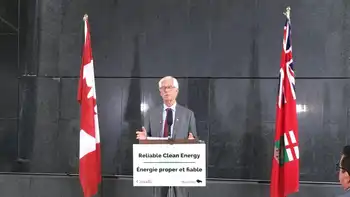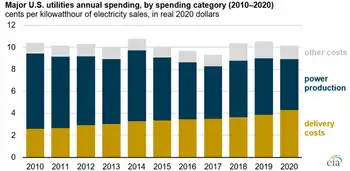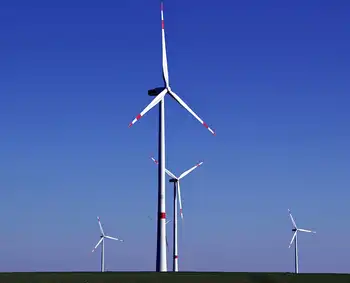Ford deal to build electric cars in Oakville comes amid $500M government cash to upgrade plant

High Voltage Maintenance Training Online
Our customized live online or in‑person group training can be delivered to your staff at your location.

- Live Online
- 12 hours Instructor-led
- Group Training Available
Ford Oakville EV investment secures government funding, Unifor deal, and plant retooling, channeling $500 million plus $1.98 billion for Canadian electric vehicle manufacturing, Windsor engine contracts, and 2025 production, strengthening Ontario's auto industry.
Key Points
Government and Ford will retool Oakville for EVs, creating jobs under a Unifor deal and Windsor engine work.
✅ $500M government funding for plant retooling
✅ Ford commits $1.98B; five new EVs by 2025
✅ Unifor deal adds Windsor engine work, jobs
The federal government and Ontario have pledged to spend up to $500 million to make the Ford plant in Oakville, Ont., able to build electric vehicles, aligning with efforts to capitalize on the U.S. EV pivot underway.
The future of the plant has been a key question for Canada's automotive industry, as moves like GM's Ontario EV deal point to broader changes, ever since the Unifor union started negotiating with the automaker for a new three-year pact to cover the company's Canadian workforce.
The two sides struck a deal a few hours after a midnight strike deadline on Tuesday morning, one that will see the company commit $1.98 billion to build five new electric vehicles and an engine contract that could yield new EV jobs in Windsor, Ont.
Ford has previously committed to spending $11 billion US to develop and manufacture electric vehicles, but so far all of that money was earmarked for Ford plants in Mexico and the company's home state of Michigan.
"With Oakville gaining such a substantial portion of Ford's planned investment, the assembly plant and its workers are better set for employment going forward," said Sam Fiorani, vice-president of global forecasting at AutoForecast Solutions.
Unifor's 'unique' Ford deal includes 5 new electric vehicles in Oakville, engine for Windsor plants
Currently, the plant builds the Ford Edge and Lincoln Nautilus, but concerns over the plant's future emerged earlier this year when a report suggested Ford was contemplating scrapping the Edge altogether. The new vehicles will come as welcome news for the plant, even as Fiorani says he worries that demand for the electric vehicles (EV) has so far not lived up to the hype.
"The EV market is coming, and Ford looks to be preparing for it. However, the demand is just not growing in line with the proposed investment from all vehicle manufacturers," he said.
Plant needs upgrade first
And the plant can't simply flip a switch and start building an entirely new type of vehicle. It will require a major retooling, and that will require time — and cash — to happen, which is where government cash comes in, as seen with a Niagara Region battery plant supporting the EV supply chain.
As first reported by the Toronto Star, the two branches of government have committed to spent up to $500 million combined to upgrade the plant so that it can build electric vehicles.
"The retooling will begin in 2024 with vehicles rolling off the line in 2025," Unifor president Jerry Dias said. "So we know this is a decades-long commitment."
It's not clear what portion of the cash will come from what branch of government, but CBC News has previously reported that Wednesday's throne speech is expected to contain a number of policies aimed at beefing up Canada's electric vehicle industry, as EV assembly deals are putting Canada in the race, both on the consumer side and for businesses that build them.
Ontario's minister of economic development and trade welcomed the news of a tentative deal on Tuesday and confirmed that Queen's Park legislators stand ready to do their part, as shown by Honda's Ontario battery investment moves in the province.
"Our government will always work with our federal colleagues, workers and the auto sector to ensure the right conditions are in place for the industry to remain stable today and seize the new opportunities of tomorrow," a spokesperson for Vic Fedeli told CBC News in an emailed statement Tuesday.











